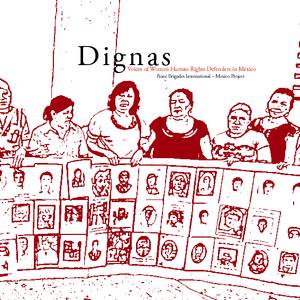Press Release
PBI Mexico
 Mexico City, 8th March 2012 – To commemorate International Women's Day, Peace Brigades International (PBI) is launching Dignas. This publication highlights the leading role played by Mexican women in social movements promoting human rights in recent decades. It also raises awareness of the current situation and the challenges facing these social activists to carry out their work: the serious threats made against them and members of their families, sexual violence, smear
Mexico City, 8th March 2012 – To commemorate International Women's Day, Peace Brigades International (PBI) is launching Dignas. This publication highlights the leading role played by Mexican women in social movements promoting human rights in recent decades. It also raises awareness of the current situation and the challenges facing these social activists to carry out their work: the serious threats made against them and members of their families, sexual violence, smear
campaigns, and obstacles in their access to justice, amongst others.
Through interviews conducted in November 2011 in the states of Guerrero, Oaxaca and Mexico City, PBI presents the work of 19 women, some of whom have worked for more than 30 years defending and promoting human rights, and describes some of their most difficult experiences. In their own words, they bear witness to the human rights violations they have observed and documented in at least 9 different states of the Mexican republic. They also explain how speaking out against these abuses has made them the target of threats, harassment and attacks.
The 18 interviews and the speech made by Bety Cariño, the Oaxacan human rights defender who died in April 2010, reflect the diversity of work carried out by Mexican women human rights defenders. This includes the defence of women's rights and those of indigenous and rural communities, the struggle for freedom of expression and access to justice, the search for the disappeared by their families, in historic and in recent cases, the security needs of citizens, the defence of environmental rights, activism in favour of sexual diversity, the situation faced by people imprisoned for political reasons, for labour rights of workers, as well as cases of torture and arbitrary detention.
The publication mainly focuses on the work of women human rights defenders (WHRDs) in the states of Oaxaca, Guerrero and Mexico City, the Mexican states where PBI has been implementing international accompaniment. However, women defenders from Coahuila, Chihuahua, Tijuana, Puebla and Mexico State also feature and cases of human rights violations which happened in Chiapas, Veracruz and Tamaulipas are mentioned.
The selection of these defenders is the fruit of PBI's work in Mexico for more than 10 years. Most of the women interviewed have requested and received international accompaniment from PBI: Tita Radilla, Valentina Rosendo Cantú, Emiliana Cerezo, Sara Méndez and Nora Minerva Martínez. The interviews with women who are not accompanied by PBI reflect some of the other issues promoted
by the human rights movement that PBI has become aware of. Their words only illustrate a small sample of the many areas addressed by female social activists across the country.
PBI has also been witness to the significant achievements made by these women internationally, such as the historic sentences in the cases brought by Valentina Rosendo Cantú, Inés Fernández Ortega, Tita Radilla and Imelda Marrufo. Alongside other women, they have taken their calls for justice to the Inter-American Court of Human Rights, which has recognised their claims of human rights abuse by the Mexican government. The release from prison of the Cerezo brothers, campaigned for by their sister Emiliana Cerezo, and of Juan Manuel Martínez Moreno, who was
supported by Sara Méndez, are two more important successes for these women defenders.
In Mexico, WHRDs are aware of the challenges related to their work. Two national meetings of women human rights defenders have been held in 2010 and 2011 with the aim of sharing experiences and searching together for solutions to their problems. One of the first fruits of this work is the 2010-2011 Assessment of conditions and risk faced in their work, by Just Associates (JASS), Consorcio para el Diálogo Parlamentario y la Equidad, A.C., and Red Mesa de Mujeres de Ciudad Juárez, A.C. published in January 2012. The assessment notes that 76% of the participating human rights defenders recognise gender specificities in the kind of violence they are subject to for carrying out their work. Of these, 40% mention sexual violence as the main form of violence and 12% refer to threats against their families and children. In 45% of cases, women human rights defenders affirmed that local, state and federal authorities were responsible, either directly or as
instigators or masterminds behind the crimes.
The United Nations Special Rapporteur on the situation of human rights defenders, Margaret Sekkagya, urges women human rights defenders to stay alert, to continue reporting attacks and threats to the competent authorities and to document and record human rights abuses systematically. She proposes to women human rights defenders: “establish protection networks at local level to improve your safety and promote unity within your community”.
Mary Jane Real, coordinator of the Women Human Rights Defenders International Coalition believes it is essential to pay attention to the basic points established in the United Nations Declaration on Human Rights Defenders to remedy the situation of risk facing women defenders. She highlights the need to respond not only to the immediate causes but also to the structural reasons behind violence and discrimination against women, which implies supporting social movements and not simply keeping women human rights defenders safe.
The publication Dignas - Voices of women human rights defenders in Mexico was produced with financial support from the Canadian Embassy's Canada Fund.
Download "Dignas" <media 8651>here</media>.
Video: Launch of "Dignas - Voices of Women Human Rights Defenders in Mexico"
